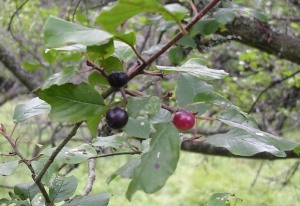Updated: 06/05/2025
Conservation biologists and climate change researchers are worried by the observed phenological changes, that is, timing of biological events. These concerns are partly motivated by the expected species-specific and thus potentially non-parallell phenological shifts among interacting species, leading to what is often-named ’mismatches’ for ’plants (that) are finely tuned to the seasonality of their environment’.
These concerns are rarely accompanied by empirical data showing that phenological change leads to changes in fitness or population dynamics, and most often they focus on a single phase in the plant’s annual cycle. In our study, we observed the timing of flowering, fruiting, dispersal and germination and their effects on fitness components in the insect-pollinated, and bird-dispersed shrub Frangula alnus (Rhamnaceae).
In our study “Are mismatches the norm? Timing of flowering, fruiting, dispersal and germination and their fitness effects in Frangula alnus (Rhamnaceae)” we found that the effects of earliness (in phenological terms) varies between different phases and between different fitness components. Thus, we argue that the timing and temporal distribution of every single phase, e.g., flowering, fruiting or germination, is not at all finely tuned, but a robust compromise to selection pressures varying between phases and years.
Kjell Bolmgren and Ove Eriksson

